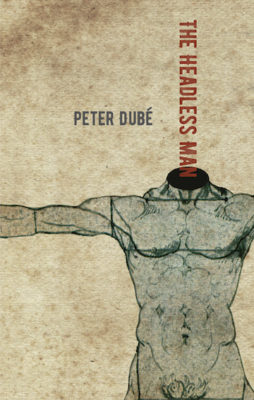“And I am curious about this catalogue of mine. I wonder at myself, and my capacity to long.”
The Headless Man is Montreal-based writer Peter Dubé’s twelfth book. His previous publications encompass novels, collections of short fiction, a novella, essays, three edited anthologies of gay and queer literature, and – like The Headless Man – a book-length prose poem. This pluralistic approach to form is mirrored in a polymath’s interest in the world. In Dubé’s own words, his work is “informed by surrealism, queer and ‘popular’ cultures, as well as a whole host of heretical and apocalyptic visions […] particularly at the points where imagination, desire and the body politic intersect.”
These themes thread through The Headless Man. The episodic prose poems chart the quest of the eponymous acephalic figure to satisfy his wish to understand the natural, urban, and eventually social-sexual world in which he finds himself born. His movement through the world is that of curious innocent, gaining understanding from sensory experience: “Instead of a retreat, he reaches out. He always does.”
The book is structured loosely in three movements. In the first, the Headless Man experiences his own birth and growing sensory connection with the natural world; in the second, he enters the machinery of state and city, experiencing unavoidable meshing with the social world; in the last, sex, self-awareness and a “gathering storm” bring both climax and close.
The Headless Man Anvil Press
Peter Dubé
$18.00
paper
96pp
9781772141559
Even though the book works as allegory (this reviewer had fun chasing references), critically, it also stands as a self-contained world. Forest, mountains, cities, bridges, riots, and a leather dungeon are vividly evoked but left unnamed, serving at once as symbols for wider themes and as their own self-contained vignettes. On reaching the city, the Headless Man visits the bank, contrasting his experiences of the world with those delineated by man-made institutions: “These people are all head: a great blank space” and “Everything is, he thinks, deliberate; there is neither happenstance nor abandon in this place.”
The question of how exactly the Headless Man does experience the world is a minor frustration of the book. Although we’re told at the start that without the primary sense organs for sight, hearing, smell, or taste, the Headless Man will use his fingers to see and will feel the vibrations of the world in his guts, the writing often conveys highly visual images. Dubé describes a visit to the movies to see The Wizard of Oz in Technicolour glory; how he “jerks at the sight of the muscled back” in a strip club.
This is a beautifully tender book, full of sensory delights for the reader and a richly erotic world. Meditations on social action and state violence sit alongside explorations of sex filtered through an impassive, curiously delicate protagonist, challenging us to interrogate our own notions of perception, social construction, and self. mRb






0 Comments